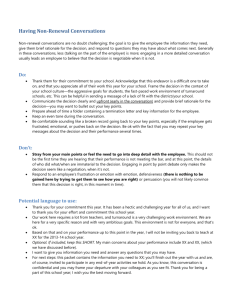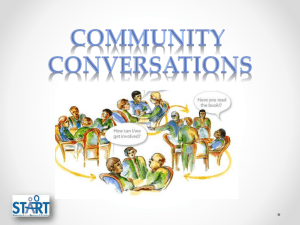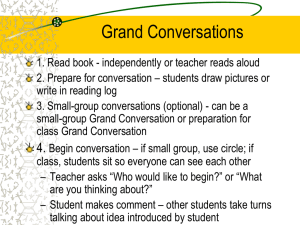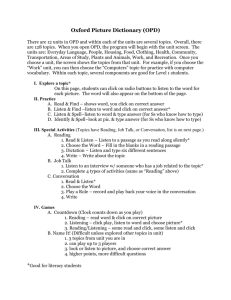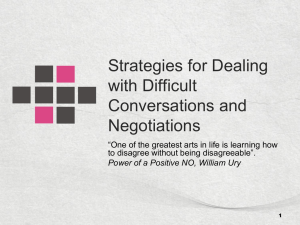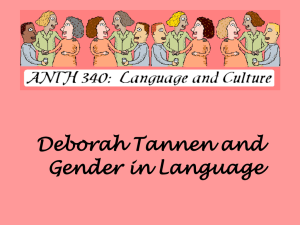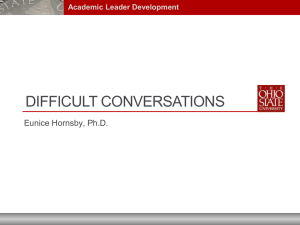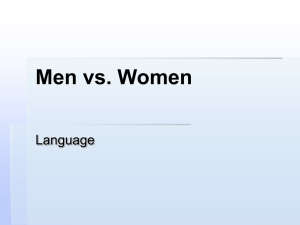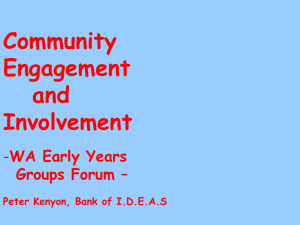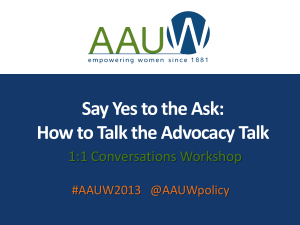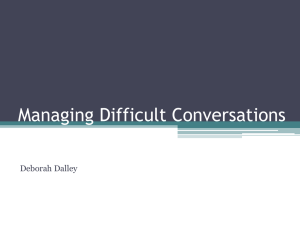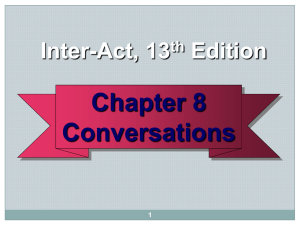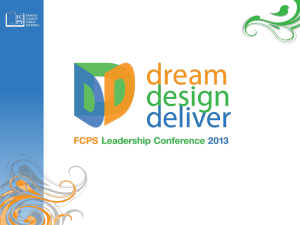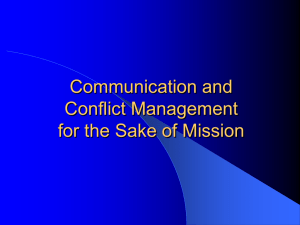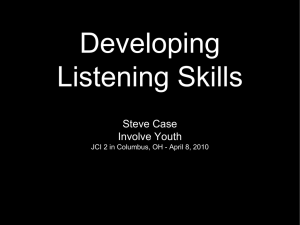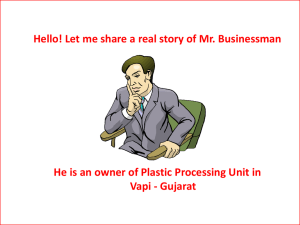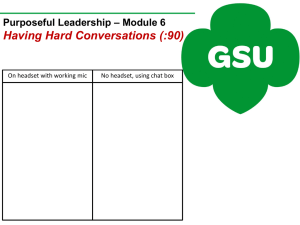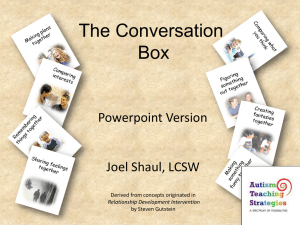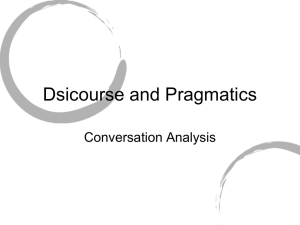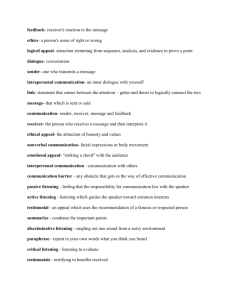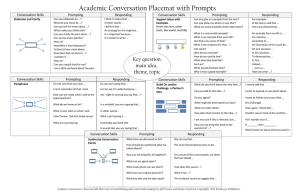“What`s possible?” not “What`s wrong?”
advertisement
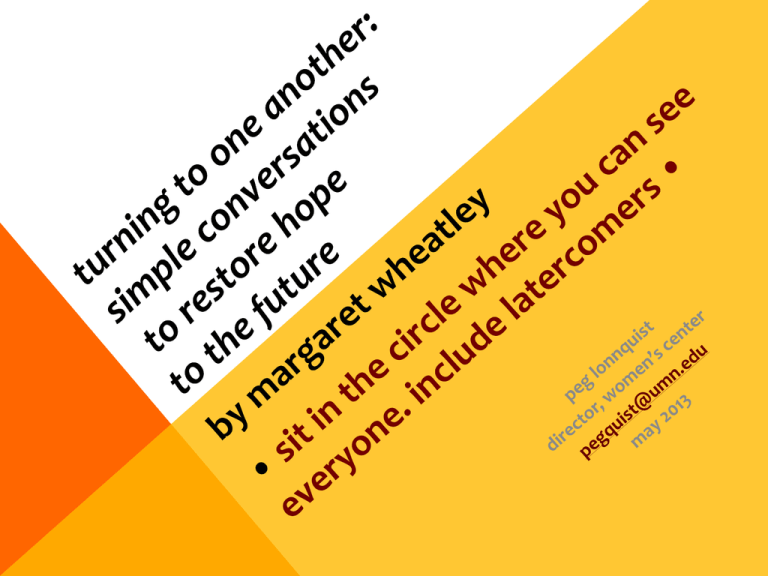
Coming up in the Best-selling Personal Leadership series! May 17- THE FIVE DYSFUNCTIONS OF A TEAM: A LEADERSHIP FABLE BY PATRICK LENCIONI (SCOTT STUDHAM, IT) MAY 31 - SWITCH: HOW TO CHANGE THINGS WHEN CHANGE IS HARD BY CHIP & DAN HEATH (MEL MITCHELL, OHR) turning to one another “i believe we can change the world if we start talking to one another again.” objectives: • review meg’s motivation for more conversations • review and practice her conversation ideas turning to one another There is no power greater than a community discovering what it cares about Ask “What’s possible?” not “What’s wrong?” Keep asking. Notice what you care about. Assume that many others share your dreams. Be brave enough to start a conversation that matters. Talk to people you know. Talk to people you don’t know. Talk to people you never talk to. Be intrigued by the differences you hear. Expect to be surprised. Treasure curiosity more than certainty. Invite in everybody who cares to work on what’s possible. Acknowledge that everyone is an expert about something. Know that creative solutions come from new connections. Remember, you don’t fear people whose story you know. Real listening always brings people closer together. Trust that meaningful conversations can change your world. Rely on human goodness. Stay together. - Margaret Wheatley check-in 1. using a talking piece • helps facilitate thoughtful conversations, changes power dynamics. may be uncomfortable for some, at first. • any object. counter-clockwise • African and Native American traditions. • Don’t speak unless you’re holding it. • Try and speak truthfully while holding it. 2. let’s begin with name & what you hope might happen here. about meg wheatley • Ph.D. Harvard University (organizational behavior and systems change) • Three other books including: Leadership and the new science – three editions. • Focus = encourage people to life cooperatively, generously, systemically, and non-hierarchically. • Founder, Berkana Institute, charitable foundation for lifeaffirming leaders and their communities around the world part one: why this book? • powerful change begins when friends or colleagues really talk/listen about things that matter to them. • humans want to be together. Truly connecting with another gives us joy. • meaningful conversations take us into a deeper realm, can restore hope, and help us work toward the common good • what if we insisted on conditions that bring out our best? And help us experience the satisfaction of working together, the joy of doing work that serves other human beings. • we can step forward to help – just need to start. • follow the energy of “Yes!” rather than accepting defeat or getting stuck in a plan. • “ a leader is anyone who sees something that needs to change and takes the first steps to influence that situation . . . The world is abundantly rich in leaders.” part two: a place to pause and reflect Am I becoming someone I respect? Reality doesn’t change itself. We need to act. part three: conversation starters 1. Do I feel a vocation to be fully human? 2. What is my faith in the future? 3. What do I believe about others? 4. What am I willing to notice in my world? 5. When have I experienced good listening? 6. Am I willing to reclaim time to think? 7. What is the relationship I want with the earth? 8. What is my unique contribution to the whole? 9. When have I experienced working for the common good? 10. When do I experience the sacred? 11. What is our role in creating change? E.g. Wangari Maathai 12. Can I be fearless? how to start a conversation 1. start with a few friends/colleagues 2. make sure topic is one that matters/they care about 3. form a real circle 4. use talking piece, when appropriate 5. check-in 6. experiment with good listening 7. don’t be afraid of silence 8. ask what made it a good conversation 9. decide if want to continue, when & where 10. check-out = what was meaningful, distressing, helpful, etc. experiment with good listening + listen to people saying new an different things. + notice when you’ve stopped listening, and bring self back. + don’t be afraid of silence - reflect and sit with them. + if people seem to be withdrawing, ask if we’re still talking about the right topic? If not, change the conversation. + others needed? let’s converse = 1. what is our role in creating change? 2. how/why use this conversational method? what made this a good conversation? check-out what is one thing you want to remember from this book/today? other conversational resources & tools • peerspirit.com- booklet of basic guidelines for hosting a circle • worldcafe.com- large groups (30-1200!) • Turningtooneanother.net • Conversation/dialogue projects • Methodologies and resources • Networking and associations • Arts and community • Youth and activism • Global organization • Notable thinkers turning to one another There is no power greater than a community discovering what it cares about Ask “What’s possible?” not “What’s wrong?” Keep asking. Notice what you care about. Assume that many others share your dreams. Be brave enough to start a conversation that matters. Talk to people you know. Talk to people you don’t know. Talk to people you never talk to. Be intrigued by the differences you hear. Expect to be surprised. Treasure curiosity more than certainty. Invite in everybody who cares to work on what’s possible. Acknowledge that everyone is an expert about something. Know that creative solutions come from new connections. Remember, you don’t fear people whose story you know. Real listening always brings people closer together. Trust that meaningful conversations can change your world. Rely on human goodness. Stay together. - Margaret Wheatley whatdyathink? please let me know to help me grow. • 2 wows • 1 what if …. thanks. (Curly Girl Designs)

